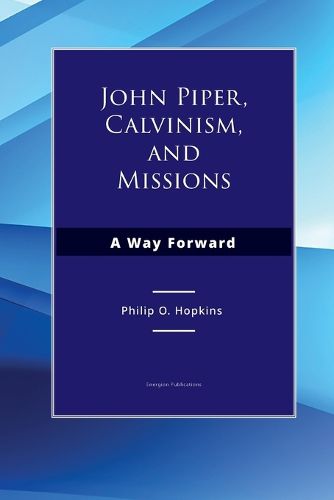Readings Newsletter
Become a Readings Member to make your shopping experience even easier.
Sign in or sign up for free!
You’re not far away from qualifying for FREE standard shipping within Australia
You’ve qualified for FREE standard shipping within Australia
The cart is loading…






This title is printed to order. This book may have been self-published. If so, we cannot guarantee the quality of the content. In the main most books will have gone through the editing process however some may not. We therefore suggest that you be aware of this before ordering this book. If in doubt check either the author or publisher’s details as we are unable to accept any returns unless they are faulty. Please contact us if you have any questions.
John Piper has been a key figure in Reformed theology for decades, and he continues to influence many. But how can Christian missions be accommodated with predestination?
This book explores the relationship between Calvinism and missions, using John Piper as a case study. It examines how Piper reconciles the doctrines of Calvinism, which emphasize God's sovereignty and predestination, with a commitment to missions and evangelism.
The author discusses Piper's background, influences, and theological development, highlighting events and people who shaped his understanding of missions. Piper's belief in Christian
Hedonism, which emphasizes the pursuit of everlasting pleasures that honor God, is presented as a foundational principle that motivates and dictates his missiology. The book delves into Piper's understanding of God's will and explores the concept of God having more than one way of willing.
This concept allows Piper to reconcile God's universal love and desire for all people to be saved with His electing love and predestination of some. The author also defines key terms related to Calvinism and missions to provide clarity and context. The book aims to shed light on Piper's internal consistency in his theological thought and to evaluate how his understanding of God's glory motivates and dictates his missiology. It is aimed at an audience that is well-informed regarding theology.
$9.00 standard shipping within Australia
FREE standard shipping within Australia for orders over $100.00
Express & International shipping calculated at checkout
This title is printed to order. This book may have been self-published. If so, we cannot guarantee the quality of the content. In the main most books will have gone through the editing process however some may not. We therefore suggest that you be aware of this before ordering this book. If in doubt check either the author or publisher’s details as we are unable to accept any returns unless they are faulty. Please contact us if you have any questions.
John Piper has been a key figure in Reformed theology for decades, and he continues to influence many. But how can Christian missions be accommodated with predestination?
This book explores the relationship between Calvinism and missions, using John Piper as a case study. It examines how Piper reconciles the doctrines of Calvinism, which emphasize God's sovereignty and predestination, with a commitment to missions and evangelism.
The author discusses Piper's background, influences, and theological development, highlighting events and people who shaped his understanding of missions. Piper's belief in Christian
Hedonism, which emphasizes the pursuit of everlasting pleasures that honor God, is presented as a foundational principle that motivates and dictates his missiology. The book delves into Piper's understanding of God's will and explores the concept of God having more than one way of willing.
This concept allows Piper to reconcile God's universal love and desire for all people to be saved with His electing love and predestination of some. The author also defines key terms related to Calvinism and missions to provide clarity and context. The book aims to shed light on Piper's internal consistency in his theological thought and to evaluate how his understanding of God's glory motivates and dictates his missiology. It is aimed at an audience that is well-informed regarding theology.